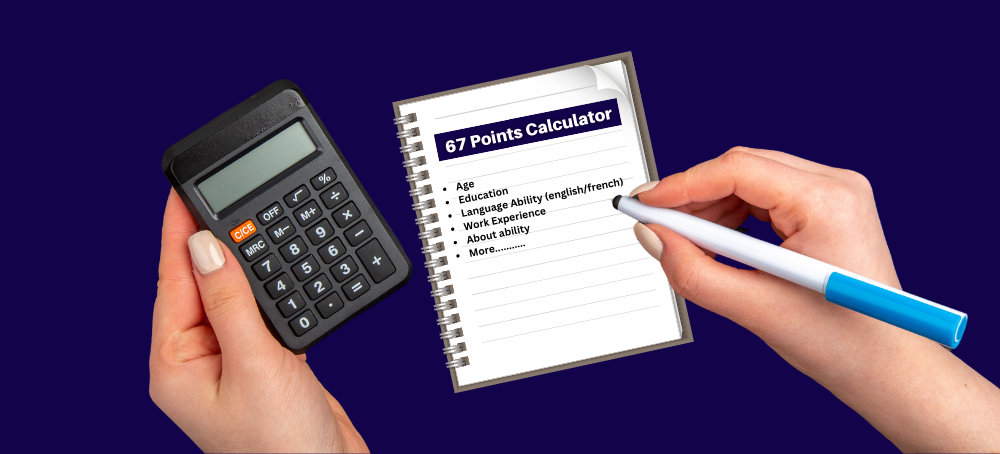Your Score
What is 67 Points Calculator
Canada PR
The 67 Points Calculator is a key tool used in the immigration process, especially for Canada’s Express Entry Program under the Federal Skilled Worker Program (FSWP).
It helps determine whether a potential immigrant meets the eligibility requirements to apply for permanent residency in Canada. To qualify, candidates must score at least 67 points out of 100 based on six selection factors.
1. Education (Maximum 25 Points)
Your education level plays a significant role in the scoring. Points are awarded based on the highest degree, diploma, or certification you have completed:
- Ph.D. or equivalent: 25 points.
- Master’s degree or two or more post-secondary degrees: 23 points.
- Post-secondary diploma of three years or longer: 21 points.
- Post-secondary diploma of two years: 19 points.
- One-year diploma or trade certification: 15 points.
- High school diploma: 5 points.
To prove your educational credentials, you must get an Educational Credential Assessment (ECA) from an approved organisation to confirm that your qualifications are equivalent to Canadian standards.
2. Language Proficiency (Maximum 28 Points)
This factor evaluates your ability to communicate in Canada’s official languages, English and French.
- First official language (e.g., IELTS for English): Up to 24 points.
- Scoring is based on your ability in four areas: reading, writing, speaking, and listening.
- CLB 9 or higher: 6 points per area (24 total).
- CLB 7 or 8: 4-5 points per area.
- Second official language: Up to 4 additional points if you achieve CLB 5 or higher in all four abilities.
High language scores significantly boost your total points.
3. Work Experience (Maximum 15 Points)
Work experience is assessed based on your paid, skilled work under National Occupation Classification (NOC) categories 0, A, or B:
- 6 years or more: 15 points.
- 4–5 years: 13 points.
- 2–3 years: 11 points.
- 1 year: 9 points.
You must prove your work experience with documents such as employment letters, contracts, or pay slips.
4. Age (Maximum 12 Points)
Age is an important determinant, with younger applicants generally receiving higher scores:
- 18–35 years: 12 points.
- 36 years: 11 points.
- Points decrease by one for each additional year beyond 36.
- 47 years or older: 0 points.
5. Arranged Employment (Maximum 10 Points)(Ceased Recently)
If you have a valid job offer from a Canadian employer, you can earn up to 10 points. The job offer must:
- Be full-time and permanent.
- Be supported by a Labour Market Impact Assessment (LMIA), unless exempt.
This factor can significantly enhance your eligibility.
6. Adaptability (Maximum 10 Points)
This factor evaluates how well you and your family can settle in Canada. Points are awarded for:
- Spouse or partner’s language proficiency: Up to 5 points.
- Previous study in Canada: 5 points.
- Previous work in Canada: 10 points.
- Relatives in Canada: 5 points for having close family members who are Canadian citizens or permanent residents.
- Arranged employment: 5 points.
Adaptability combines personal and family factors to improve your chances of success.
How the Points Are Tallied?
You need to achieve at least 67 points out of 100 to qualify under FSWP. However, even if you meet this threshold, you will still need to enter the Express Entry pool, where your Comprehensive Ranking System (CRS) score will determine your invitation to apply for permanent residency.
Why the 67 Points Calculator Matters?
The calculator is a vital first step for potential immigrants, offering a clear view of whether they meet eligibility requirements. It identifies areas that require improvement, such as:
- Boosting language test scores.
- Gaining additional work experience.
- Enhancing qualifications through education or certifications.
Practical Example
Let us consider an applicant, Jane:
- Age: 30 years (12 points).
- Education: Master’s degree (23 points).
- Work Experience: 4 years (13 points).
- Language Proficiency: CLB 8 in English (20 points).
- Adaptability: Relative in Canada (5 points).
Total: 12 + 23 + 13 + 20 + 5 = 73 points. Jane qualifies for the FSWP.
Essential Tips to Succeed in Your Canadian PR Visa Application Under the Federal Skilled Worker Program
1.Maximise Your Language Scores
- Focus on achieving CLB 9 or higher in English (IELTS) or French (TEF/TCF).
- Practice consistently for the speaking, reading, writing, and listening sections.
- Consider taking both English and French tests to earn extra points.
2. Boost Your Education Credentials
- Get an Educational Credential Assessment (ECA) for your highest degree.
- If possible, pursue additional qualifications equivalent to Canadian standards to increase points.
3. Gain Relevant Work Experience
- Ensure your work experience aligns with Canada’s NOC 0, A, or B categories.
- Provide clear documentation: letters from employers, contracts, and pay slips.
- More years of skilled experience mean higher points (6 years = max points).
4. Age Matters
- Apply when you are in the prime age bracket (18–35 years) to secure the maximum 12 points.
5. Secure Arranged Employment (Optional)
- A valid job offer from a Canadian employer adds up to 10 points.
- Use Canadian job portals like Job Bank, LinkedIn, or employer-specific websites.
6. Optimise Your Adaptability
- Leverage points for a spouse’s language proficiency, previous Canadian study/work experience, or having relatives in Canada.
7. Prepare Proof of Funds Early
- Maintain sufficient liquid assets as per the latest IRCC requirements.
- Ensure your financial documents are well-organised and meet IRCC standards.
8. Stay Updated with IRCC Policies
- Regularly check the official IRCC website for changes to eligibility criteria and proof of funds requirements.
9. Create a Strong Express Entry Profile
- Double-check all details in your application.
- Ensure accuracy in documents and submissions to avoid rejections.
10. Consult Experts
- Cross Border Experts are always available to assist you with every detail of the often-daunting process. Our goal is to ensure that you avoid refusals due to inadequate documentation or clerical mistakes while filing your application. After all, a refusal can be very damaging!
Proof of Funds: A Key Requirement for FSWP under Express Entry
Proof of funds is a critical requirement for the Federal Skilled Worker Program (FSWP) under the Express Entry system. It demonstrates that you have enough financial resources to support yourself and your family members after arriving in Canada.
1. Why Is Proof of Funds Required?
The Government of Canada requires proof of funds to ensure you can settle successfully without immediate financial strain. This applies to most candidates unless they:
- Have a valid job offer in Canada.
- Are applying under the Canadian Experience Class (CEC).
2. How Much Money Do You Need?
The amount required depends on the size of your family, including yourself, your spouse or common-law partner, and any dependent children. These amounts are updated annually based on Canada’s Low-Income Cut-Off (LICO). As of June 3, 2024, the minimum funds required for applicants have been adjusted as follows:
| Number of Family Members | Funds Required (in CAD) |
|---|---|
| 1 | $ 14,690 |
| 2 | $ 18,288 |
| 3 | $ 22,483 |
| 4 | $ 27,297 |
| 5 | $ 30,690 |
| 6 | $ 34,917 |
| 7 | $ 38,875 |
| Each additional member | +$ 3,956 |
3. What Qualifies as Proof of Funds?
You must provide official letters from financial institutions showing that you have access to the required funds. These funds must:
- Be readily available (liquid and accessible).
- Belong to you (or your spouse/common-law partner, provided you are travelling together).
- Be free from any debts or obligations (e.g., loans, mortgages).
The official letter must:
- Be on the financial institution’s letterhead.
- Include your name and contact information.
- List outstanding debts (e.g., credit card debt, loans).
- Detail all your bank and investment accounts, including:
- Account numbers.
- Account balances.
- Average balances over the past 6 months.
4. Acceptable Proof of Funds
- Cash in your bank account.
- Liquid investments (e.g., stocks, bonds, mutual funds, or term deposits).
- Bank drafts or traveler’s checks.
5. Funds That Do Not Count
- Equity in real estate or other non-liquid assets.
- Borrowed money or lines of credit.
6. When Do You Need to Show Proof?
You must provide proof of funds at two key stages:
- Submitting your application: When completing your Express Entry profile, you declare how much money you have. Official documentation is required later.
- At the time of entry to Canada: The border officer may ask for proof of funds. Ensure that the funds are still available.
7. Special Exemptions
You are exempt from providing proof of funds if:
- You already have a valid job offer in Canada.
- You are applying under the Canadian Experience Class (CEC).
8. Practical Tips
- Keep your funds above the required amount to cover fluctuations due to exchange rates.
- Update your proof of funds documentation if there are significant changes in your financial situation during the process.
- Be prepared to explain the source of funds if you have recently received a large deposit.
Why Proof of Funds Matters
Proof of funds is a safety net ensuring that you can meet your basic needs during your initial months in Canada while finding a job or settling in. Properly preparing and documenting your finances is crucial for a smooth application process.




